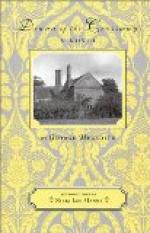She attributed the change to the influences of nature’s beauty and grandeur. Nor had her woman’s consciousness to play the chrysalis in any shy recesses of her heart; she was nowhere veiled or torpid; she was illumined, like the Salvatore she saw in the evening beams and mounted in the morning’s; and she had not a spot of seeresy; all her nature flew and bloomed; she was bird, flower, flowing river, a quivering sensibility unweighted, enshrouded. Desires and hopes would surely have weighted and shrouded her. She had none, save for the upper air, the eyes of the mountain.
Which was the dream—her past life or this ethereal existence? But this ran spontaneously, and the other had often been stimulated—her vivaciousness on the Nile-boat, for a recent example. She had not a doubt that her past life was the dream, or deception: and for the reason that now she was compassionate, large of heart toward all beneath her. Let them but leave her free, they were forgiven, even to prayers for their well-being! The plural number in the case was an involuntary multiplying of the single, coming of her incapacity during this elevation and rapture of the senses to think distinctly of that One who had discoloured her opening life. Freedom to breathe, gaze, climb, grow with the grasses, fly with the clouds, to muse, to sing, to be an unclaimed self, dispersed upon earth, air, sky, to find a keener transfigured self in that radiation—she craved no more.
Bear in mind her beauty, her charm of tongue, her present state of white simplicity in fervour: was there ever so perilous a woman for the most guarded and clearest-eyed of young men to meet at early morn upon a mountain side?
CHAPTER XVI
TREATS OF A MIDNIGHT BELL, AND OF A SCENE OF EARLY MORNING




